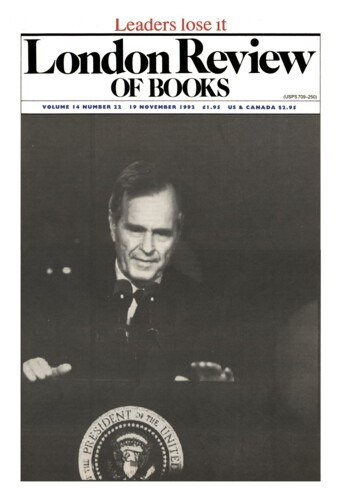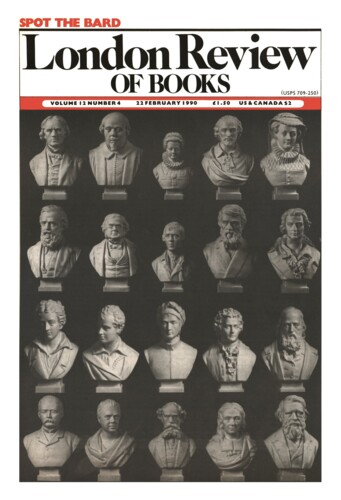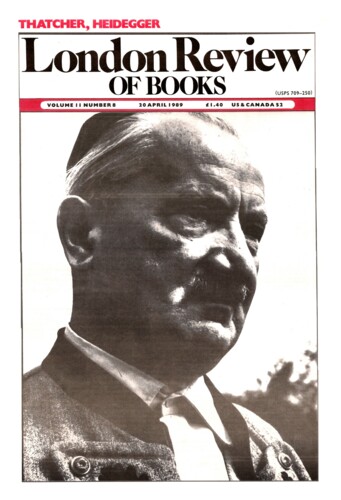Philippa Tristram
Philippa Tristram most recent book, Living Space, is discussed by Peter Campbell in this issue. She is a senior lecturer in English at the University of York.
Tiananmen Revisited
Philippa Tristram, 19 November 1992
‘China must go forward; you shouldn’t dwell on what’s past,’ an American told me in Beijing last summer. He had decades of experience in China, and I could see what he meant, from a Chinese point of view. But from a Western one, Tiananmen does need to be revisited. If the bookstalls in Beijing offer only grossly biased accounts of ‘the Beijing turmoil’, at least few read them and fewer still believe them: the Chinese press is government-controlled. Western accounts of ‘the Tiananmen massacre’ are also biased and even more inaccurate, but many read them and most believe them: the British press is ‘free’.
Little Bottles
Philippa Tristram, 22 February 1990
In the days of the Boxer Rebellion, when Chinese wore pigtails and exposure to foreign values was compulsory, they knew that Westerners were Chinese upside-down. As Yang remarks in The Miraculous Pigtail, which is set in that period: ‘Chinese shave their heads, foreigners their faces; Chinese write from right to left, foreigners from left to right; Chinese call the compass the “needle for fixing the south”, foreigners call it the “needle which points north”; Chinese have their tea-cup lids on top, foreigners have their, tea-cup lids underneath.’ Since 1900, time has removed some of these oppositions and introduced others, but that perception endures. To the farm hands in Mimosa, set in the early Sixties, America is ‘an outlandish, promiscuous, immoral country, but so rich that no one worries about food or clothing’. When six years ago one of my Chinese students described a Westerner’s day, he was succinct: his Western businessman rose at six o’clock to take his two snakes for an airing in his chauffeur-driven Mercedes; they stopped at a pub en route, emerged blind-drunk, and crashed the car into a scholartree. Sarah Lubman recently explained in the Washington Post that Chinese students are the victims ‘of an educational system which presents limited – and biased – information about the West’, but my student at least had merely been reading some American magazines donated by a foreign visitor. Among the advertisements for drink, expensive cars and sexual aids, I remember finding one for a cat’s four-poster, complete with curtains and fur underlay. In the context of that Beijing institute where even hot water (for all purposes, especially drinking) was rationed to one thermos per student per day, his account seemed inaccurate in details, not essentials. According to Sarah Lubman, the way to counter such misinterpretation is cultural exchange: then Chinese travelling abroad can see what Western democracy really is, while those at home can receive unbiased information from foreign experts. As in the days of the Boxer Rebellion, ‘exchange’, it seems, is not a two-way process.’
Miss Simpson stayed to tea
Philippa Tristram, 20 April 1989
Most great writers, if only in indirect ways, offer some representation of their own life, but the biographer faces a particular problem where interpretation has already been shaped by his subject in autobiography. Wordsworth was not the only writer of his period to dislike the public appetite for private information, or to seek to forestall the biographer’s ‘abominable use’ of letters and personal anecdote by trying himself to control what should, and should not, be offered to the public. Moreover, in the different versions of The Prelude, and in the notes dictated late in life, he offered different interpretations.
Pieces about Philippa Tristram in the LRB
Four Walls
Peter Campbell, 20 April 1989
The Picturesque, with its cottages ornées and simulations of Tuscan rusticity, is hard to take seriously. Yet it accompanied a radical change in English architectural thinking. This happens...
Read anywhere with the London Review of Books app, available now from the App Store for Apple devices, Google Play for Android devices and Amazon for your Kindle Fire.
Sign up to our newsletter
For highlights from the latest issue, our archive and the blog, as well as news, events and exclusive promotions.



